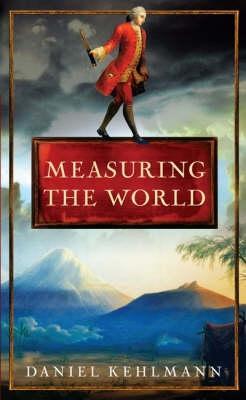 Measuring the World
Measuring the World Daniel Kehlmann
Translated by Carol Brown Janeway (German)
Originally 2005, I read 2007 Quercus hardcover
259 pages, historical fiction
Found: used at Kolkata Book Fair 2015
Alexander von Humboldt is an obsessive, highly trained all-around scientist who constantly measures, observes, and records all kinds of data. He sets off for South America with the goal of discovering the inland connection between the Orinoco and Amazon rivers, observing air pressures at different altitudes, and determining whether the earth is really made up of water. All of this is described in letters to his brother, a high-ranking politician in Germany, which are published in the newspapers.
Carl Friedrich Gauss has an innate capacity for numbers that allows him to make the greatest mathematical discoveries since Newton, in fields ranging from algebra to geodesy to astronomy. Unfortunately, he is also an ass to those around him, especially when he feels they think too slowly to keep up with him.
Alternating between the stories of these two men, Kehlmann tells an ironic, drily humorous story that is as much about science as it is about interpersonal relationships and learned German society in the early 19th century.
The Man of Science as Emotionless Beast
Like many other authors and television shows (Big Bang Theory, anyone?), this novel depicts these two highly intelligent men as emotionally distant, often rude jerks. Humboldt, for example, often treats his good friend and traveling companion Aime Bonpland as a servant, refusing to take breaks from their adventure even when he is ill. In fact, Humboldt shows more affection for a stray dog that he adopts than he does for any of the people around him. Like Sheldon Cooper on The Big Bang Theory, this is often played for laughs - but I didn't find it amusing. I felt rather sorry for Humboldt, who seems to have several mental disorders, not to mention his seemingly repressed homosexuality.





